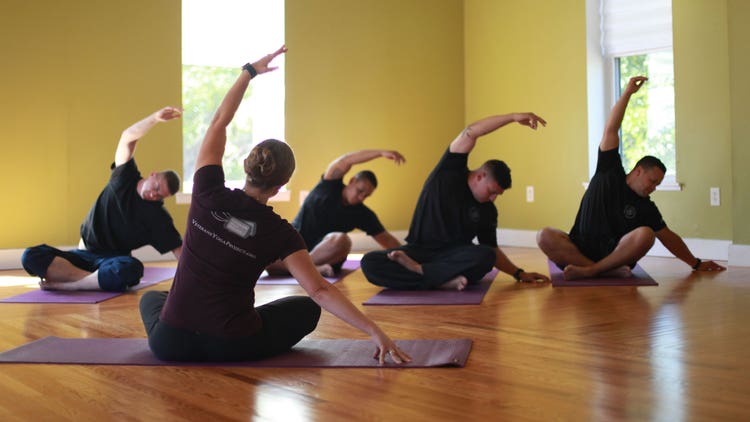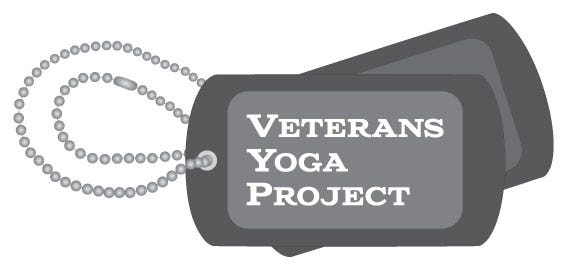Reconnecting With a Sense of Self, With the Veterans Yoga Project

An average of 20 U.S. veterans commit suicide each day—Veterans Yoga Project (VYP) is doing its part to bring that number down to zero.
Dedicated to improving the health and well-being of military veterans, Veterans Yoga Project is a nonprofit educational and advocacy organization on a mission to support recovery and resilience among our vets, families and communities. It provides advanced training in mindful resilience for yoga teachers and health-care professional, free yoga classes for veterans, and multi-day healing retreats for veterans and their family members.
“We believe every veteran has earned the right to reintegrate into civilian life fully empowered to become successful, well‐rounded individuals in healthy relationships with their families and their communities,” explains Christian Allaire, veteran, full-time yoga teacher and COO of Veterans Yoga Project.
Downward spiral

More than 2 million American vets are struggling with symptoms of post-traumatic stress, interfering with their ability to navigate everyday situations and reintegrate into civilian life.
Post-traumatic stress disorder is a mental illness related to trauma and stress that may develop after witnessing or experiencing an overwhelmingly traumatic or terrifying event—leading to semi-permanent changes in the nervous system and the way the body responds to stress stimulus. The nervous system becomes deregulated during a traumatic experience and may become “stuck” in emergency response mode (aka “fight, flight or freeze”), responding to current circumstances through the lens of the traumatic experience.
Symptoms of post-traumatic stress include nightmares, intrusive memories and dissociative flashbacks; persistent avoidance and isolation; concentration difficulties; increased physiological/emotional arousal (hyperactivity, irritability, sleep problems and difficulty concentrating); and severe emotional pain—almost all of it caused by the dysregulation of the nervous system.
Such severe symptoms make it nearly impossibly to function day-to-day, leading to difficulties in job and academic performance, as well as family responsibilities followed by severe psychosocial problems, such as divorce, unemployment, substance abuse, homelessness, and financial and legal issues. It’s a vicious downward cycle fueling the high suicide rate among U.S. veterans.
Intervention

Studies have shown that yoga therapy is effective for veterans struggling with PTSD when it is tailored to emphasize nervous system regulation, mindfulness and acceptance. Veterans Yoga Project teaches self-regulations skills, equipping veterans with the inner tools and resources they need to feel empowered and in control.
“Being able to consciously shift from a hyperarousal/vigilant state to a calm, rational state gave me the strength to handle my day.” —Kyle, U.S. Marine Corps
The organization’s Mindful Resilience/Mindful Yoga Therapy program consists of five tools: breath, meditation, mindful movement, guided rest and gratitude—adapted and applied to maximize their proven effectiveness to regulate the nervous system, ultimately undoing the dysfunctions underlying the symptoms of post-traumatic stress.
In order for any type of healing to take place (physically, psychologically or otherwise), the nervous system must first be re-balanced. There are two main branches of the body’s autonomic nervous system (ANS): the sympathetic nervous system (SNS) and the parasympathetic nervous system (PNS). When the SNS is overactive, such as in the case of people suffering from post-traumatic stress symptoms, the body is a continual state of “fight or flight.” When the PNS dominates the autonomic nervous system, the body is in a state commonly referred to as “rest and restore.”
While the SNS works hard to keep everything operating at a high level of arousal (for survival purposes), the PNS promotes relaxation, regulation and restoration, repairing the bodily wear and tear caused by the SNS when we’re stressed. What’s more, the parasympathetic nervous system is also the part of the ANS that also allows us to be present in a relaxed state with an open attitude of compassion and acceptance, as well as our ability to communicate and connect to others.
By turning their attention inward and becoming more familiar with their inner environment (which can be scary enough for those of us without PTSD), veterans struggling with post-traumatic stress begin to build a safe space within where they can take refuge when needed. Through the practice of mindfulness and meditation, they learn to stay with uncomfortable feelings, thoughts and emotions without analyzing or reacting. And with the nervous system down-regulated, they can begin to get the sleep, rest and relaxation they so desperately need—creating a strong foundation for recovery and ultimately resilience.
“Veterans Yoga Project did one more thing for me. It gave me a full night sleep. That may not seem like much to most people, but for someone who had not slept more than an hour or two at a time for over five years, it was huge.” —Tom, Marine Corps Veteran
Opportunities and resources

Veterans Yoga Project aims to provide support to all veterans, whether they are currently suffering with severe symptoms or they are focused on increasing resilience and giving back to their brothers and sisters. Working in partnership with veterans, active-duty military personnel, student veterans’ organizations and other nonprofits, Veterans Yoga Project offers more than 100 free yoga classes each week across the U.S. for veterans and their families. All classes are taught by VYP-trained instructors who have completed their Mindful Resilience Training for Trauma Recovery.
“The mindfulness yoga turned out to help me refocus on the here and now and what’s important.” —Jack, Vietnam Veteran
Veterans Yoga Project also holds multi-day healing retreats designed specifically for veterans with post-traumatic stress and their families. Retreats not only offer a reprieve from the often stressful day-to-day routine and associated responsibilities, but they also create the space necessary to heal by releasing traumatic imprints and learning new ways of thinking and being that supports their recovery and resilience. Additionally, VYP offer a unique opportunity to heal relationships with significant others.
For those struggling with stress symptoms but can’t find a VYP class or make a multi-day healing retreat, Veterans Yoga Project offers a fantastic “practice library” on its site, including audio files of each of the five tools of Mindful Resilience/Mindful Yoga Therapy (breath, meditation, mindful movement, guided rest and gratitude) and a downloadable VYP practice guide.

Get Involved
There are many ways to become involved with Veterans Yoga Project, including donating, volunteering or hosting a fundraising class. Or become a VYP-trained yoga instructor and take its Mindful Resilience Training for Trauma Recovery, developing the skills to safely and effectively use yoga and mindfulness as a complementary therapy in a variety of settings.
Photo credit: Courtesy Veterans Yoga Project; Hamish Duncan, Unsplash; Daniel, Adobe Stock; Robert Sturman, courtesy Veterans Yoga Project